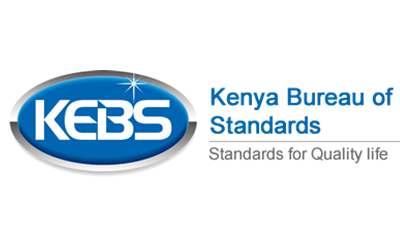STANDARDS LEVY
1. What is Standards Levy?
- The Standards Levy is a monthly remittance payable by all manufacturers to the Kenya Bureau of Standards (KEBS) under The Standards
Act Cap. 496 Section 10B (1)
2. Who is considered a manufacturer?
- “A manufacturer” is a person(s) producing, processing, treating,
installing, testing, operating, or using goods or materials
3. What are the registration requirements?
1: Business/organization registration number (BRS)/Certificate of
Incorporation
2: Director’s/owner’s National ID number
3: KRA Pin
4. What is the procedure for registration?
- Registration is done online through KIMS (KEBS Information Management System):
- Go to the KEBS website → Online Services → KIMS.
- Or directly visit kims.org.
- Log into KEBS KIMS → “Sign Up”
- Enter BRS registration number + Director’s ID
- Complete required details
- Fill out Form SL/1
- Click Apply
- Receive Entry Number + Registration number (via SMS & email)
5. How is the Standards Levy calculated?
- The levy is typically calculated as a percentage of a company’s monthly turnover, subject to the exemption threshold and payment ceiling.
- It is charged at 0.2% of the turnover of goods manufactured or services offered for sale, excluding VAT, Excise Duty, and discounts.
6. When should the payment be made?
- The levy for a given month must be paid on or before the 20th day of
the following month, in accordance with Section 10C(1) of the Standards (Standards Levy) Order, 2025
7. How do I pay?
- Log into KRA iTax
- Go to Payments → Payment Registration
- Tax head = Agency Revenue → Sub-head = Standards Levy
- Generate Payment Registration Number (PRN)
- Pay as instructed
8. When should payments start?
- Payments and submission of monthly remittance should begin from
the month the business commences sales.
9. Who is exempt from paying the Standards Levy?
- Manufacturer with an annual turnover below Ksh. Five Million is exempt from paying the Standards Levy.
10. What is the payment ceiling for the Standards Levy?
- The levy has an upper limit (ceiling) on the amount payable per year,
of Ksh. Four Million.
11. When do the new payment ceilings take effect?
- The new payment ceiling takes effect from 08th August 2025.
12. What happens if the Standards Levy is not paid on time?
- A manufacturer who defaults shall be liable to pay a 5% penalty of the
amount unpaid per month cumulatively as specified under Section
10B (3) of the Act.
13. In the event of closure, a manufacturer is required to;
- Submit a formal notification indicating closure of the company (an
official letter to the KEBS Director) - Email: info@kebs.org (CC: standardslevy@kebs.org).
- State closure date & reason
Construction and Engineering
- Building and Civil Engineering/ general engineering.
- Carpentry and Joinery
- Electrical communication, installation, fitting and wiring.
- Painting renovation, fitting and vertical blinds.
- Plumbing and water proofing
- Sewers and drainage construction.
- Steelworks and fabrications.
- Steel plants, steam boilers and gas installation.
- Lift installation and elevators.
- Terrazzo works/Flooring.
- Partitioning and suspended ceilings installation.
- Quarry ballast, concrete blocks and non-metallic mineral products.
- Roofing contracts.
- Road construction, landscaping and excavation.
- Fire systems, installation and commission.
- Glazing
- Electronic communication/installation
- Electrical contractors.
- Mining of semi – precious stones and materials
- Gemstone cutting, processing of gems and precious stones (Jewelry).
- Woodwork (carving, furniture and fixtures).
- Irrigation engineering.
- Drilling /bore hole contractors.
- Excavators & Back filling contractors.
- Saw millers.
Electrical Engineering
- Computer engineering installation, repair and maintenance.
- Data processing
- Software development
- Networking
- Power generation
- Telephone equipment wiring, installation and maintenance.
- Electrical rewinding and repairs.
- Cinematography
- Colour separation and processing i.e studios.
- Advertising and sales promotion material design and production.
- Alarm installation and electric fencing.
- Air conditioning, refrigeration and ventilation.
Textiles
- Tailoring
- Dry-cleaning
- Weaving, embroidery, spinning, knitting
- Cotton ginneries
- Dyeing
- Tanneries
- Sisal Processing
- Hides and Skins Processors
- Curtain material Processors
- Leather/fur Processing
- Footwear manufacturers
- MUB and EPZ factories
Mechanical Engineering
- Crankshaft grinding
- Panel beating and Spray painting
- General repair and maintenance.
- Metal works
- Transport operators
- Motor cycle and bicycle assemblers and garages.
- Lift assemblers and maintenance firms
- Body builders
- CKD Owners
- Spare parts manufacturer/reconditioning /engravers
- General fabrication and aluminum metal works.
Food and Agriculture
- Beverages, alcoholic drinks processing.
- Prepackaged foods
- Fresh produce/ prepackaged foods
- Horticulture and flower firms
- Abattoirs (butcheries), meat processing firms
- Dairy Industry (Milk Processing)
- Animal fees
- Fish/sea foods products
- Jaggaries
- Coffee/tea processing
- Bakeries, confectioners and food compounders
- Millers – posho/grain.
